
33 minute read
Adopt A Pet
PETSITTERS
A Whole Lotta Love Dog Walking & Pet Services
Serves the Durham area. awholelottalovedogwalking.com 919-491-3567 Dog walking, daily visits, overnight stays, home care and pet transportation.
Barbie & Company Pet Services
Serves the Durham area. barbieandcompanync.com 919-659-5492 Dog walking, daily visits and pet photography.
Bull City Pet Sitting
1821 Hillandale Rd., Ste. 1B-189 bullcitypetsitting.com 919-740-7481 Dog walking, trail walks, daily visits and home care.
Citizen Canine Durham
Serves the Durham area. citizencaninedurham.com 919-358-4465 Dog walking, daily visits and overnight visits.
Dickinson Animal Services
101 E. Delafield Ave. dickinsonanimalservices.com 919-323-5341 Daily visits for pet and farm sitting, farm maintenance and small dog boarding.
dogwalk
Serves the central Durham area. dogwalktalk.com 919-697-6048 Provides dog walking, daily visits, home care and personalized grocery shopping.
Gator’s Pet Sitting
3314 Glenn Rd. facebook.com/gatorspets 919-201-5706 Dog walking, daily visits and home care.
Kate’s Critter Care
Martin Luther King Jr. Pkwy. at Hope Valley Rd. katescrittercare.com 919-943-8083 Daily visits, overnight stays and home care.
Lucy’s Pet Care
Serves the Durham area. lucyspetcare.info 919-451-3773 Dog walking, daily visits, home care and pet sitting.
MoPups NC
3926 Kelly Dr. mopupsnc.com 828-450-8025 Dog walking, daily visits, overnight stays, pet transportation, day care and boarding.
Nose, Toes & Tails Pet Care
Serves the Durham area. nosetoestails.com 919-418-3899 Dog walking, trail walks, daily visits and pet transportation.
Paws on Durham
1821 Hillandale Rd., Ste. 1B-261 pawsondurham.com 919-627-8738 Dog walking, pet transportation, daily visits and home care.
Teacher’s Pets NC
Serves Durham, Chapel Hill, Wake and Johnston counties. teacherspetsnc.com 919-714-9459 Dog walking, daily visits and overnight stays.
Triangle Pet Care
Serves the south Durham area. trianglepetcare.com 919-358-5271 Dog walking, daily visits, overnight stays, home care and pet transportation.
Two Girls and a Leash LLC
Serves Bahama, North Durham and Rougemont. twogirlsandaleash.com 919-471-4597 Dog walking, daily visits and farm care.
Very Important Pets Professional Pet Sitting
Serves the Triangle. vippetsitting.com 919-419-1647 Dog walking and pet sitting.
Zen for Your Zoo
Serves southwest Durham. zenforyourzoo.com Dog walking, daily visits and home care.
984-219-2579
DR. JENNY BENNETT

LET US SHOW YOU THE DIFFERENCE FREE EXAMS FOR NEW CLIENTS
PERSONALIZED WELLNESS PLANS ROUTINE SURGERY DENTISTRY ONLINE BOOKING SICK VISITS BOOK TODAY!
800 TAYLOR ST., STE 9-155 DURHAM URBANTAILS.VET
SPONSORED CONTENT A D
PT A PET
TAKE HOME ONE OF THESE WONDERFUL CATS FROM THE ANIMAL PROTECTION SOCIETY OF DURHAM TODAY!

Kiki
Kiki is very sweet, but can be a bit timid when you first meet her. She adores chin scratches and will run right over to let you know she wants them. She loves playing with wand toys and still acts like a kitten. She’ll be a great companion for one very lucky person!
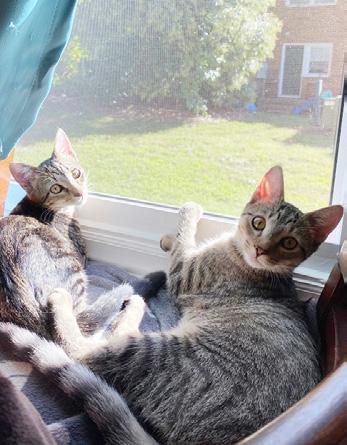
Cheddar and Muenster
Cheddar and Muenster love each other so much. They enjoy playing and snoozing together – they’re lifelong playmates! Cheddar is the most adventurous kitten. She’s a master cuddler and the best work buddy. Muenster, is very high energy and loves to play. There’s not a toy that does not engage her. She recently discovered a love of playing fetch!
Adoption fees for cats are $95 and $50 for the second cat when adopting two together. Dog adoption fees range from $100 to $175. Fees for other animals vary. The shelter, located at 2117 E. Club Blvd., is limiting shelter traffic to appointment-only visits for surrenders and lost pet searches. Send an email to adopt@apsofdurham.org if you are interested in adopting any of the animals in foster care. For more information, visit apsofdurham.org.
2020


We'll be here for you and your family in good times and uncertain times
Park Veterinary Hospital is dedicated to providing compassionate veterinary care to Durham’s pets. Full-service, friendly, affordable . . . and boarding, too!

ParkVeterinaryHospital.com 735 W NC Hwy 54 Durham, NC 27713
919.246.4093
At Piedmont Wildlife Center’s afterschool program, Cora Fletcher, 8, and Teagan Works, 5, watch as Maya Dardess (center), 8, chases Rhys Works, 8, in a game similar to tag, but instead of using their hands, the kids use pool noodles to stay safe and distanced.
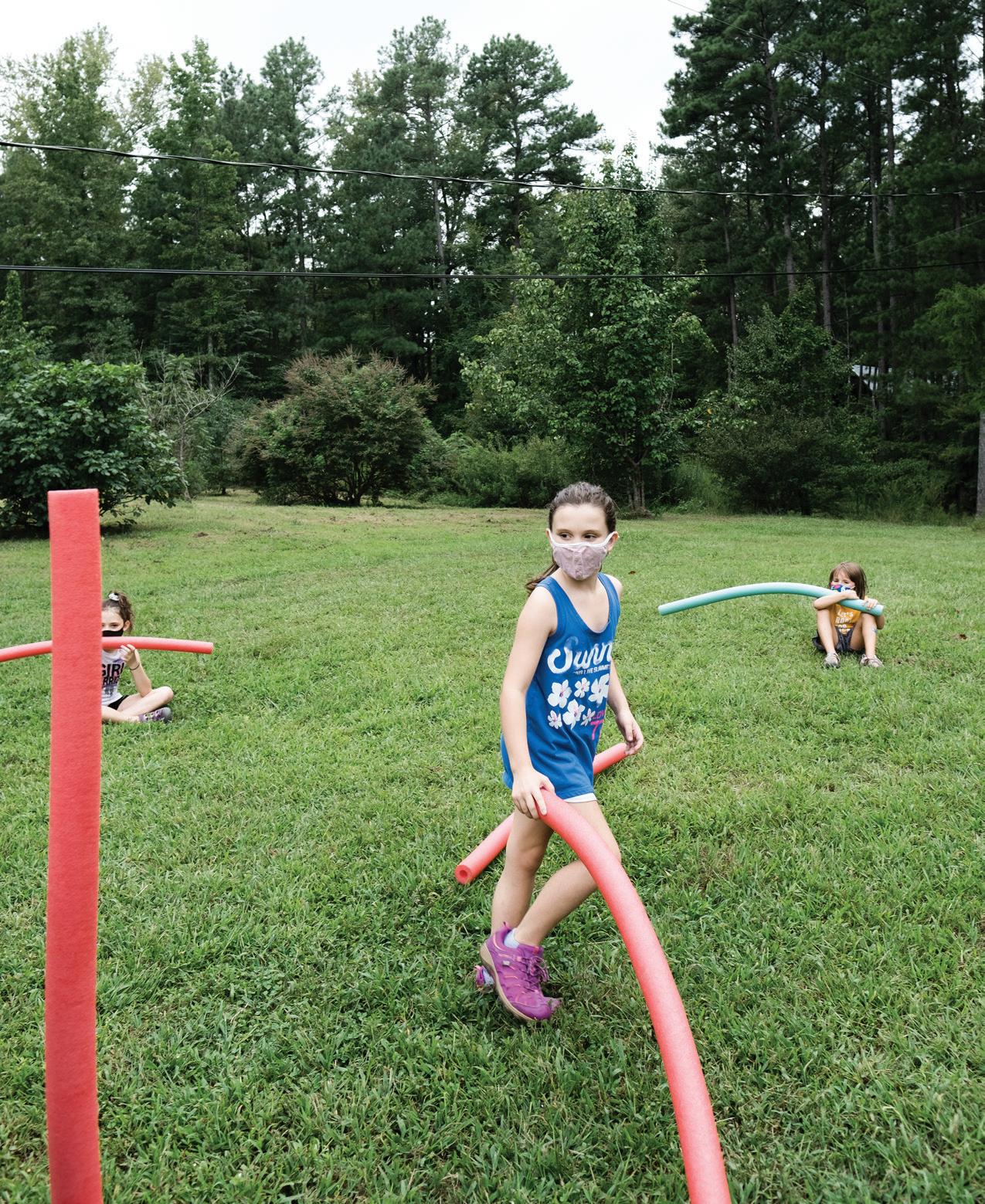
BACK IN ACTION I I
Programs to keep kids active and engaged this fall and beyond
BY AMBER WATSON
| PHOTOGRAPHY BY CORNELL WATSON
remember a time when our child’s extracurricular calendar was full of camps, sports and after-school activities; we never worried about having enough social interaction or ways to keep busy. This year, with camps and sports canceled and school shifting online, I find myself, like many other parents, on the hunt for safe, fun alternatives to keep our child active, engaged and social – if not in person, at least virtually.
CREATIVEOUTLETS
For children who enjoy art and theater, the Durham Arts Council hosts several virtual classes for ages 5-12, including cartoon sketching, anime drawing, dancing, musical theater and after-school art to keep those creative juices flowing. Some online classes meet weekly or monthly and are affordably priced at $50-$60 total for a course. As fall and winter progress, DAC may offer additional virtual options.
Durham Arts Council also provides themed project kits with topics like animals and outer space, created for ages 5-11. Kits can be ordered at any time through the DAC website and picked up from their building downtown or mailed for an additional cost. Each kit includes instructions for five-six
relies on trained volunteer coaches in their own communities. This year, the nonprofit provides two types of team options in response to COVID-19: fully virtual or in-person with some virtual components. Teams, which consist of 6-10 girls, meet two times per week for either 60 or 90 minutes; they hold practice, journal and, at the end of the season, run a celebratory virtual 5K. The in-person model practices safety measures, such as wearing masks and remaining socially distant. Even with the virtual options, participants will still be ABOVE Lucille Botta,9, her mom and coach, Jamie Botta, and Flora Gering, 9, warm up together while moving, interacting and engaged. remaining socially distanced. BELOW Adaora Spector, 9, Sabrina “Breezy” Ingui, 9, Jamie, Kaia Yorkery, One benefit of the virtual 9, Flora and coach Berkeley Yorkery in the middle of a team-building activity. model is that it allows the flexibility to team up with projects, educational information someone from another state! on artists/art forms and supplies. Perhaps a family member or
DAC Artist Services friend whose parent can co-coach Manager Susan Tierney’s 8-yearand their children can take part in old daughter, Rosie, participated the same group from afar. in almost all of DAC’s virtual You can find existing teams summer camps this year, with on the website under “Our weeks of puppetry camps and Locations.” The cost is $170 per cultural camps focused on participant, but the organization Japan, Finland and Trinidad believes that all girls and and Tobago. “My favorite camp communities should have access was puppet making, because I to its programs, and need-based liked all the puppets I made and scholarships are available. Even if singing ‘The Rainbow Connection’ [from ‘The Muppets’] with my you miss signing up this fall, there will be more opportunities in the friends,” Rosie says. She enjoyed using the chat box feature on the spring season, which starts in February. Zoom camps to talk with other kids, and Susan liked that the online Jamie Botta, Girls on the Run of the Triangle’s communications lessons gave her the opportunity to get comfortable with virtual and outreach manager, volunteered to coach a team at her daughter’s learning using content that was especially fun and interesting. school when she was in kindergarten and too young to join GOTR. Now, she is excited to have her own child on a team and is thrilled MOVEMENTMATTERS they “just have to walk down the street to meet up with neighbors and friends to practice this season.” Does your daughter miss taking part in team sports? Girls on the Run “As a coach, I found myself surprised (in a good way!) by the of the Triangle offers an eight-week program (the current season runs Girls on the Run curriculum,” Jamie says. “The program is much from Sept. 21-Nov. 14) for girls in grades 3-5 and 6-8 that inspires more than simply lessons weaving in physical activities – it’s a them to build confidence and other important life skills through source of positive energyfor us, while also laying a foundation for dynamic, interactive lessons and physical activity. The organization resilience in tough situations.”
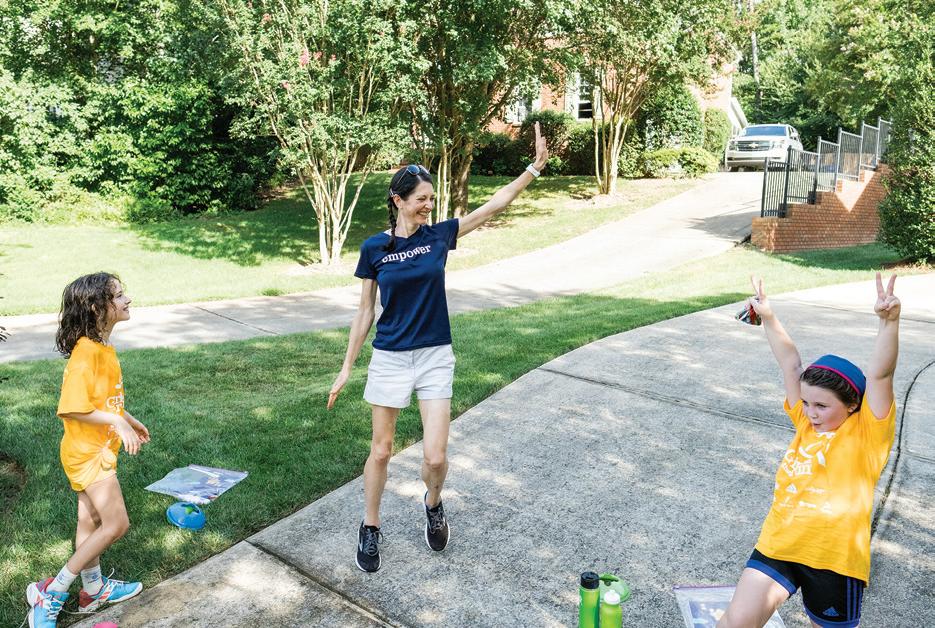
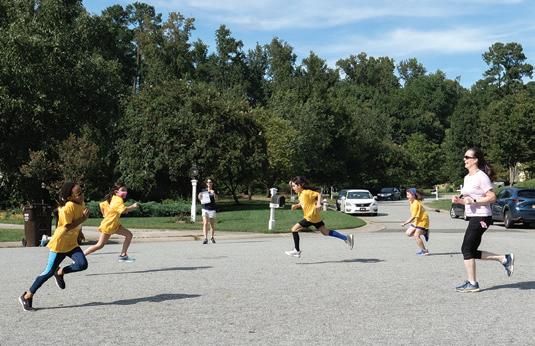
For families who aren’t part of a team this fall, try the GOTR at Home kit, which includes 16 lessons and interactive activity pages that your daughter can use to capture her ideas and feelings. “It’s OK that we don’t have superpowers, because we really do,” Jamie’s daughter, Lucille, 9, shared with her after one such lesson in the GOTR summer kit. “Our legs help us go really far, and our minds have the power to figure things out.”
Other good skills to practice are yoga and mindfulness, which helps kids (and adults) cope with stressful times. Growga hosts programs that include intentional movement in partnership with businesses, organizations and schools. It recently linked up with Durham Public Schools to share pre-recorded, 30-minute “Wellness Wednesday” videos each week for pre-K to teenage students. The lessons promote physical health as well as social and emotional wellbeing. “They teach children how to deal with stressful situations, big emotions and change, which is even more relevant during COVID-19,” says Growga Founder Emily Behr.
I sat in on a short virtual lesson with my pre-teen, and we both felt it was easy, engaging and calming, providing a little breather in the middle of the day.
There is an overarching theme each month, and each week integrates an element from that theme. Take “compassion,” for instance. Along with some light physical activity, there is a prompt to write down some thoughts. There are also prompts for parents to elicit healthy discussions.

ABOVE Kaia leaps toward the end of the cul-de-sac after completing a run around the neighborhood. BELOW Kyle Tompkins, 5, Rhys and counselor Micah Segal-Miller work on building a bridge from nearby logs.

Growga also provides virtual classes that are open to the public, a number of after-school classes, and flexible, private home school sessions for small groups and pods. These in-person, child or family sessions can be held safely at parks, parking lots or other open spaces.
For pre-K and elementary-age children, try the lively, interactive options at Tinkergarten. It began its fall season in mid-September with two sets of weekly online circle time (one for ages 2-5 and one for 5-8), which consist of 30-minute sessions for kids to sing, move, share and learn together. Each week has a different lesson built around the season’s theme of creativity. Parents receive a book list and weekly read-aloud, printable resources to help set up and support play throughout the week as well as videos about children’s learning and development.
“It’s all designed to help us connect “When Maya comes home from to our community and the outdoors, Piedmont, she is often muddy and [and] to launch hours of purposeful tired, but always happy,” Pam says. (and independent!) play at home,” says “She always has a ton of stories Kate Macartney, a Tinkergarten leader. about what they’ve done. A couple
The cost per family for an eightof weekends ago, Maya and I had week session is $72, and you can a ‘mom-daughter’ day where she choose any class that works best for requested to go to the park where your family (even one from the other Piedmont has their camp so that she side of the country). could show me her favorite spots. We
If your family loves getting on the visited the swamp area, saw her group’s water, try Frog Hollow Outdoors’ child camp circle and an obstacle course and family kayak classes, clinics and they had made from natural objects, tours. Self-guided traveling outpost Maya, Cora and Rhys continue work on the bridge. and then she showed me the ‘big mud trips occur on weekends through midKyle decides to take a quick dip in the creek. pit’ where they play capture the flag.” November and rotate between Falls Another after-school option is the Lake and Jordan Lake. Museum of Life and Science’s “Museum Clubhouse,” created in response to ACTIVEAFTER-SCHOOL school closures this fall, which offers small, in-person groups from two to five days per week for a full day (8 a.m.-4 p.m.). MLS also runs inPiedmont Wildlife Center is located at the 82.8-acre Leigh Farm Park, person home-school classes that are open to all elementary- and middle which dates back to a mid-19th century working farm that included school-age students as a way to supplement virtual school experiences almost 1,000 acres and at least 16 enslaved people; PWC staff are with hands-on STEM learning. upfront in sharing the land’s history and its people with visitors. Both programs have safety modifications in place: masks, physical
Already well-known for its nature-based summer camps, PWC distancing, cohorts of 10 or fewer and heavy sanitation. It’s an ideal continues its after-school and Wednesday programs through the way to get outside and socialize, especially for home schoolers. first semester, and its conservation team shares many of the animal Durham nonprofit SEEDS runs programs for elementary encounters as virtual field trips for schools from all over the country. Staff (SEEDlings), middle (SAPlings) and high school (DIG or Semillas) also instated robust virtual options for all ages as a way to connect with students. SEEDlings Coordinator Felix Pittman felt safest beginning nature from home, including encounters with some of PWC’s animal the fall as mostly virtual for grades 1-3 which meet virtually Monday ambassadors, a citizen science project in the Triangle Turtle Trekkers, and Thursday, and grades 4-5 which meet Tuesday and Friday from who catalog box turtles they come across, and virtual birthday parties. 3-5 p.m. On Wednesdays, small groups of up to five students come for
“I like that it gives me a chance to go outside,” says Maya Dardess, an in-person afternoon at the SEEDS campus. 8, a third grader at Creekside Elementary School who’s been a camper SEEDlings are provided kits that include gardening tools, notebooks, at Piedmont Wildlife Center for several summers and is now enrolled craft supplies and other materials they use during virtual programming. in its after-school program. “Their trails are really fun to go on and the During the first half of the week, they cover gardening, farming and counselors are silly and fun to hang out with.” One of her most-loved nature, and during the second half, they focus on social-emotional activities is climbing Grandmother Cedar, a large cedar tree with low learning goals such as mindfulness, coping and communication skills. branches at the front of the property. “While I have skills and really enjoy farming and nature, I’ve been a
Maya was eager to get moving after sitting in front of a screen during social worker for eight years and feel like my best skills shine through the first week of remote learning. Her parents both work full time and in our social-emotional programming,” Felix says. “We will also have could not take a break at the end of Maya’s school day to play; when dance parties, music time (during which I play my ukulele and sing for they learned that PWC had an after-school program that fit with Maya’s the students), scavenger hunts and yoga.” school schedule, they jumped to sign her up. Maya’s mom, Pam Dardess, Programs are getting their pandemic footing, and it’s a lot easier to was comfortable sending her daughter to an outdoor camp that had find options for our children compared to last spring. Our lives look specific COVID-19 safety measures in place, such as small groups, welldifferent this year, but we can also take advantage of some of the new trained staff, masks, and a detailed plan and protocols. and creative ways to keep our children involved, active and social.
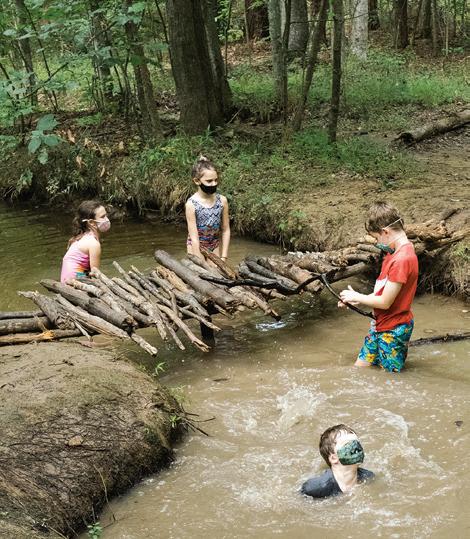

YOU’VE CLASS GOT

Tips for a successful school year from 20-plus Durham educators
ILLUSTRATIONS BY CHRISTIN KING, DESIGNER AT @CK.CREATIONS
*Responses have been edited and condensed for clarity
PRACTICE MEANS PROGRESS, NOT PERFECTION
When creating a schedule, set realistic goals. Some find it helpful to allot 30 minutes to an hour a day for each subject. Other students may choose to study science and math on Mondays and Wednesdays, then review English and history on Tuesdays and Thursdays.
I set high academic goals for all of my PHOTO BY CORTLAND GALLOWAY scholars just as I would in the classroom. When developing academic goals, I am mindful that technology is not always reliable, and students may lack necessary computer skills. When activities do not go as planned, I am patient and transparent with students because we are truly all in this together!
This is a challenge for everyone: teachers, students and families. It’s important to be flexible. As my principal, Dr. Sheldon Lanier, says, ‘We are building the plane as we are flying it.’ Families can strive for success by focusing on progress. Set small goals, such as studying for 30 minutes or attending office hours twice a week. Families should hold students accountable for missing assignments. Also remember to celebrate small wins – learning how to navigate different digital tools such as Canvas, Google Meet or Zoom is no small feat. Practice means progress, not perfection. To everyone navigating this new reality: Hang in there.” – Sonya West, seventh grade science teacher, Sherwood Githens
Middle School
DO SOMETHING SPONTANEOUS AND FUN
Ihave found that children and adults are most successful when they make an effort to find a balance of routine and spontaneity. With everything being digital at the moment, even I have a difficult time wrapping my head around my to-do’s if I don’t write it down on paper first. For students, having a physical notebook or journal could help organize their goals, thoughts, assignments, etc., while also providing the opportunity to be driven and motivated by completing tasks – an essential life skill. A great daily routine for your student ‘outside’ of virtual school needs to include: a good night’s sleep, eating healthy food, going outside, completing school work, revisiting their to-do’s and – the most important – doing something spontaneous and fun.” – Margaux H.
Holly, fourth grade teacher, Parkwood Elementary School COMMUNICATE, COMMUNICATE AND COMMUNICATE
Students flourish when given structure. Establish routines and schedules so they know what to expect and when to expect it. In a home environment, students need an area where they can focus and not be distracted. That does not mean lying in bed or on the couch. Those are comfortable places, but not conducive to listening and responding to others attentively. A table or desk works much better. As a given, TVs and phones should be off or distant to minimize distractions. More than one student or child in a room may interfere with concentration as well.
Some students actually excel and find their ‘voice’ in the online classroom. Your child may be one of them. Learning can be difficult and often is, even in person. Before I start teaching subject matter, I work on instilling self-efficacy. Help your child overcome by encouraging them, believing in them and advocating for them. Also, believe in yourself. As I tell my students every year, ‘You teach me how you want to learn.’ You already know how your child learns best. Use that to your advantage. Communicate your child’s needs to their teacher. Communicate any difficulties you or your child may be having. Communicate, communicate and communicate!” –
Brandon Daniel, fifth grade science and math teacher, Burton Magnet Elementary School; 2019-2020 DPS Teacher of the Year

CREATE A PLAN
Students benefit from routine; students should try to have a designated workspace. If they are working at different locations around the house, their brain may not make the same connection to the material they’ve already learned, and distractions may increase. It’s important for high school students to learn to advocate for themselves. Adults can help their students practice what they are going to say to their teacher or find the proper way to put it into an email. Guide them when asking for help if they have clarifying questions about assignments, are going to have conflicts between their home life and virtual learning, and/or feel as if they are getting behind. Creating a plan for long-term assignments or missed work is a great strategy to reduce feeling overwhelmed; adults can help students talk through their assignments and create a plan for their work.” – Sarah
Parents: Slow down and simplify your schedule. You need to be more organized this year in order to follow the COVID-19 protocols we have in place on campus. It’s important to allow yourself the time to get you and your child ready for the day with as little stress and rushing as possible. Make lunch the night before, get up 15 minutes earlier, have your child pick out their clothes before bed … whatever works for your family.
We have a phrase, acknowledging how COVID-19 has changed things: ‘Same, same, but different.’ We start with what is familiar and then we build on that by showing them what will be different. We introduce differences lightheartedly, though we always acknowledge that there might be some sadness or disappointment about the changes at first. We give them space to say that they miss something or are frustrated and also if something makes them nervous. They seem to be finding the new routines (now that they are becoming familiar) as pleasurable as the old ones!” – Betsy Evans, early childhood teacher,
Montessori School of Durham
RELATIONSHIPS, RIGOR AND RELEVANCE
Virtual learning is all about relationship building and constant check-ins. I have been in awe at the resiliency of my students. They email and text me daily to inquire about assignments. They ask to stay after class as needed. Relationships, rigor and relevance have always been three aspects of my instruction and my vision as an educator. I’ve been focusing a lot on relevant topics with my students; we recently started to analyze music and lyrics for English language arts skills. I have noticed that incorporating relevant topics with my students have made them more comfortable and confident in this uncomfortable setting. If I can get them talking, I can get them learning.” –Keaundra Robinson, eighth grade language arts teacher,
Rogers-Herr Middle School; 2019 Rogers-Herr Teacher of the Year
KEEP JOY IN LEARNING
My biggest piece of advice to parents, especially for those of young children, is to keep joy in learning, even when it is the opposite of what you are feeling. The early years of education lay the foundation for a child’s attitude about school and learning. Student attitudes about school greatly impacts their performance. While this is an extremely stressful and, at times, frustrating moment in time, we don’t want those feelings to trickle down to our children and have them begin to associate school and learning with stress and frustration. While there are days where we all want to explode, we need to remember our end goal – our children’s success. Happy students become motivated students who become successful students.” – Amber Shastri, kindergarten teacher, Immaculata Catholic School
BE AN ACTIVE PARTICIPANT
Positivity is key as teachers are trying their hardest to provide quality instruction and build relationships with students in an entirely new fashion. Be proactive by reaching out to your teachers when you have questions about assignments or need additional support. We’re here for you! Finally, be an active participant. It is very easy to feel isolated in a remote learning environment. Engage with your teacher and peers during live classes, contribute to class discussions, and don’t be afraid to share your opinions!” – Kelsey Jones, eighth
grade English language arts teacher, Lucas Middle School
GO BEYOND THE ADMISSIONS OFFICE’S MARKETING PITCH
One thing to hold onto is that you, as a student, have the most leverage in the college applications process before you commit to attending a particular school. Before putting down that deposit, reach out to the admissions office and ask them how their institution is weathering this storm. Ask to sit in on a class to see how they are managing virtual learning. Reach out to professors and students for conversations that go beyond the admissions office’s marketing pitch.” – Stefan Waldschmidt,
Upper School college counselor, Carolina Friends School
PREPARE THE NIGHT BEFORE
As a first grade teacher and a mom of two teenagers, I know how difficult virtual learning can be for families. But I’m excited about the opportunities it is giving us to discover new and innovative ways to deliver instruction.
Create a quiet learning spot for each child. Implement a calm, consistent morning routine so that your child is ready to learn when their first class starts. Prepare the night before: Make sure your child plugs in their computer, sets out learning materials, organizes their learning spot, etc.
If you have teenagers, empower them to communicate with their teachers – they can still copy you on emails. This is a great opportunity for them to take responsibility for their learning. Be patient with yourself, your children and the educators!” – Meg Reed, first grade
teacher, Creekside Elementary
KEEP MOVING!
During this abnormal year full of screens and sitting, it is critical that we take care of our health and wellness! We can do our best learning and work when we take care of our minds and bodies. In addition to daily time for physical activity, build in movement breaks in your daily routine – set a timer for one minute of movement every hour, go on a walk, take a stretch break, play your favorite song and dance, and remember to play and have fun (parents, too!) Whatever it takes, keep moving your body!”– Kristin Stroupe, Lower School PE
teacher and varsity cross-country and track coach, Durham Academy
LET YOUR CHILD BE THE ‘STAR’
Preschool in a hybrid model can be scary. I’ve found that doing a virtual home visit – I spend 30 minutes with each of my students, seeing whatever they choose to present on the screen – alayed many of the fears and gives us something to build a relationship with. Kids get my undivided attention, mask free. I’ve received pet parades, toy demonstrations and even read a story to an extended family in New York, all from my Durham dining room. Teaching kids to use basic hand signals will show the class that you are engaged even while muted. Practice muting and unmuting the mic; in-class learners can be distracted by ambient noise. Let your child be the “star” on screen; kids enjoy seeing their classmates, not parents or empty chairs. Bringing flexibility and patience to each encounter will reduce stress and foster a spirit of cooperation. Remote or in class, sharing ideas, pictures and stories with classmates is key to building a learning community.” – Rose DeLaTorre, transitional kindergarten
teacher, Triangle Day School
NEVER GIVE UP
Working in a distraction-free zone (if possible) is really helpful as well as staying organized by making to-do lists, maintaining focus and participating during class, and finally, communicating with their teachers regarding any help they may need.
Overall, I’ve seen many students succeed during remote learning because they have a positive attitude, ask a lot of questions, communicate with their teachers, collaborate with their peers on assignments and continue to persist through the challenges.
We are in uncharted territory, but all I can say is, ‘Never give up!’ We can’t predict or plan for the challenges we may face during remote learning, but stay persistent and self advocate! Communicate with teachers regularly and remain flexible, because things can change very quickly, as we learned this year.” – Jennifer Curry, sixth grade language
arts teacher and English language arts department chair, Rogers-Herr Middle School
USE METACOGNITION
Attending school in a virtual setting definitely presents some unique challenges, but the keys to achieving success this year are similar to other school years: have a positive mindset; organize materials, workspace and assignments; break larger assignments into manageable chunks; advocate for yourself by seeking help from educators, parents and peers; and use metacognition – awareness or analysis of one’s own learning or thinking processes – to recognize strategies that work. My students have benefited from creating an organized workspace to complete schoolwork. At Hill Learning Center, the middle school program focuses on teaching students to utilize executive functioning skills, like breaking larger projects into manageable chunks to reduce student anxiety and increase successful outcomes. We also ask students to use metacognition to identify effective strategies that help them learn and study.” – Darius Horton, middle school language arts
department, Hill Learning Center

SOME PRODUCTIVE STRUGGLE IS ESSENTIAL TO LEARNING
Have a family meeting to establish expectations. Talk with your child(ren) about how the school day will go, talk about the schedule, talk about what could be challenging and brainstorm ideas of how to get through the challenges together. Create your own family agreement that everyone signs, and then post it in a visible place in the home.
Consider posting a schedule where your child can see what will be happening throughout the day. You can also add your child’s schedule to Google Calendar, and connect the calendar to an Alexa or Siri device that will read a reminder prior to online meetings or activities for your child.
Consider using timers to help your child. Some children appreciate knowing how much more time is needed on an activity.
Ask your child questions and have them share their thoughts while encouraging their independence so they can take ownership of their learning. Some productive struggle is essential to learning. Stepping in too quickly to help solve problems will deprive your child of the opportunity to learn, try new approaches and gain greater independence and confidence.” – Jenni Scoggin and fellow
Lower School teachers, Carolina Friends School
THE POWER OF ‘YET’
Your family’s mental and physical health is the most important thing right now. Take advantage of breaks during the day or during the week. Make time for your family. If things get overwhelming, reach out to your teachers and let them know.
Have your student practice their typing skills outside of school. There are free programs available online, and many incorporate games.
Remember the power of ‘yet’! As we are all learning in new ways, we may need multiple opportunities to learn a concept. Remind students (and yourself) that it is OK if things aren’t perfect … yet. As long as we keep trying, we are doing great things.” – Elizabeth Gallegos-Moore,
exceptional children’s instructor, Rogers-Herr Middle School
DON’T FORGET ABOUT PAPER AND PENCIL
So many of my students tell me they don’t know how to do certain math problems, when they really mean they don’t know how to do them in their head. With all the digital resources schools are relying on, don’t forget about paper and pencil. Keeping supplies accessible encourages kids to actually use them, instead of feeling lost looking for a starting place. It’s also a good break from staring at a screen!” – Taylor Brown, seventh and
eighth grade math and Math 1 teacher, Immaculata Catholic School
KEEP IT FRESH AND INTERESTING
Keep it simple. Make learning as accessible as possible for your child and the adults supporting them. Keep it inclusive. Make sure that students can be a part of the learning experience. Continue to bring their individual interests and perspectives into learning. This helps with keeping conversations and content fresh and interesting.” – Steven Mercado, second grade teacher and director
of diversity, equity and inclusion, Triangle Day School DEVELOP A PASSION
Turn on the camera when in a remote class. Teachers can’t gauge how you are doing or make adjustments if they are looking at black squares. It also minimizes the temptation to look at your phone. Hold yourself accountable to be engaged. And, don’t be afraid to ask questions – teachers welcome the interruption.
We will [still] be talking about the pandemic 20 years from now. What do you want your story to be? Instead of worrying about what you can’t do, consider this time a gift to learn something new, to develop a passion. If parents do this and encourage their children to do the same, this attitude will translate to success in their academics.” – Shannon Namboodri, instructor of engineering,
North Carolina School of Science and Mathematics
GIVE STUDENTS A STAKE IN THEIR OWN SUCCESS
While these circumstances are not ideal, they are proving to be a catalyst for growth of team-oriented, self-sufficient and successful students. Students: prove to yourself, parents, teachers and classmates that you have something to offer, that you are willing to be a part of your team’s success, and remember that your team is there for you as well. Take your own learning seriously and stay busy – it will make the day go by faster, I promise. Give students a stake in their own success. My students help decide class jobs – yes, believe me, there is still plenty of responsibility to go around! – consequences for positive and unfavorable behavior and what cool reinforcement they try to earn throughout the days and weeks. Simply put, what works is seeing the students not just for what they need, but also for what they have to offer.” – John Cappello,
second grade grade teacher, Creekside Elementary School
MAKE CONNECTIONS
There is a tendency to only use learning management systems to monitor your child’s assignments and grades. Families can also use these systems (and what they overhear during a Zoom lesson) to discover what topics and vocabulary kids are taught in school. If you know your child is studying fractions, invite him to help measure the ingredients for dinner. If you know your child is learning about character, plot and setting, use this vocabulary when you talk about her favorite show. Making these connections makes learning more authentic and increases engagement.” – Jennifer Harrison, upper EL teacher,
Morehead Montessori Magnet Elementary School
ORGANIZE YOUR ONLINE BINDER
Teachers are using everything from email, Canvas inbox, Remind messages, Smore newsletters, ClassDojo, Seesaw, PowerSchool and more to connect with students and families. Please get connected to classes, and make sure to read updates!
If we were in the classroom, we would start the year off organizing binders. This year, I encourage all students/families to take some time to organize their Google drives. Make a folder for each class. Plan how students will title documents. Consider including their name and the subject in the title. Just like you would clean out binders, once a week go through your drive and make sure all items are labeled correctly and sorted/stored in the correct folders.” – Dorothy “Addie” Carr, eighth grade social studies
teacher, Rogers-Herr Middle School
SEND ME AN EMAIL
Iencourage students to recognize that there will be challenges, try to problem solve and then learn from those experiences. I also encourage them to reach out to their teachers by sending an email with specific questions. As for keeping up with assignments, students need to clarify with each teacher where daily assignments for that class are posted on the website. Every night, students should review each class’s page to check for assignments. For long-term assignments, use a calendar, scheduling specific tasks to be completed by a certain time.” – Kerrie Goray, middle school language arts teacher,
Hill Learning Center
FLEXIBILITY AND IMPROVISATION
Ibelieve students respond better when we admit that we’re all working together to figure this out. Kids need structure, of course, but I’m trying to let ‘structure’ take the form of clear expectations and plans for how we will handle it when things inevitably don’t go according to plan. Flexibility, improvisation and an open-hearted acknowledgement that, hey, it’s really tough right now, and we all need to be committed to one another in order to make it through.
I also think that students do much better when they feel personally invested. Assignments can feel like pulling teeth when teaching remote, but much less so when the student feels some ownership over the project.” – Austin Campion, upper school theater arts teacher and
CFS Performing Arts Center director, Carolina Friends School

Offering classes for all ages, preschoolers through adults
We encourage our dancers to be hardworking, independent, responsible and passionate people in all aspects of their lives.
VIRTUAL AND IN-PERSON CLASSES NOW OPEN FOR FALL! COVID-19 PRECAUTIONS IN EFFECT 3642 Shannon Road, Durham, NC 27707 919 489 5100 contact@barriskilldance.com BARRISKILLDANCE.COM
2020
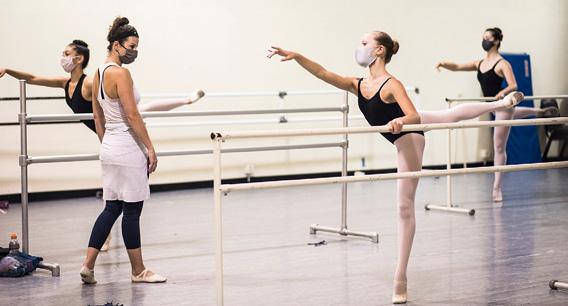
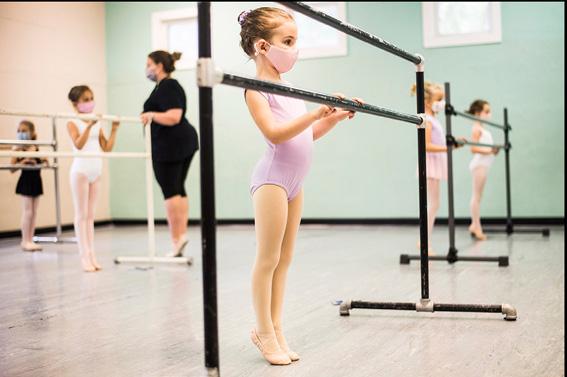
PHOTOGRAPHY BY LAUREN SOIGNET
Students who are continuing the school year virtually from home will more frequently turn to their parents or guardians and ask how to spell a word or carry the remainder. Thankfully, there are those who are actively improving the experience of learning from home and mitigating the restrictions caused by COVID-19.
The Durham Public Schools Foundation is made up of a board comprised of parents, educators and alumni who aim to build community support for Durham Public Schools and galvanize resources and partnerships from across the community to help strengthen our public schools for all students.
In the spring, more than 2,300 donors, volunteers and partners of the organization provided more than 375,000 meals to children and families at the height of the shutdowns that closed schools.
Now, the foundation is campaigning to raise $1.5 million for its
Accelerating Digital Equity initiative to provide digital devices and access for nearly 33,000 students, many in lower-income families, in
Durham Public Schools. As of mid-September, 644 donors have raised $869,000.
“This was a need that already existed,” says Katie Spencer Wright, development and communications manager for the foundation.
Magan Gonzales-Smith, the foundation’s executive director, says there are four essential pillars that have to be in place to achieve digital equity for students: learning centers, technical support and digital literacy, ongoing student needs for equipment and teacher training. Currently, DPS, Student U, YMCA and Kate’s Korner are all operating learning centers. Other partners may join the collaborative.







